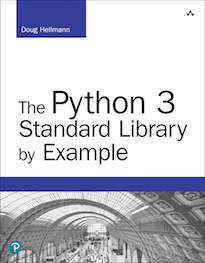ChainMap — Search Multiple Dictionaries¶
The ChainMap class manages a sequence of dictionaries, and
searches through them in the order they are given to find values
associated with keys. A ChainMap makes a good “context” container,
since it can be treated as a stack for which changes happen as the stack
grows, with these changes being discarded again as the stack shrinks.
Accessing Values¶
The ChainMap supports the same API as a regular dictionary
for accessing existing values.
import collections
a = {'a': 'A', 'c': 'C'}
b = {'b': 'B', 'c': 'D'}
m = collections.ChainMap(a, b)
print('Individual Values')
print('a = {}'.format(m['a']))
print('b = {}'.format(m['b']))
print('c = {}'.format(m['c']))
print()
print('Keys = {}'.format(list(m.keys())))
print('Values = {}'.format(list(m.values())))
print()
print('Items:')
for k, v in m.items():
print('{} = {}'.format(k, v))
print()
print('"d" in m: {}'.format(('d' in m)))
The child mappings are searched in the order they are passed to the
constructor, so the value reported for the key 'c' comes from the
a dictionary.
$ python3 collections_chainmap_read.py
Individual Values
a = A
b = B
c = C
Keys = ['b', 'c', 'a']
Values = ['B', 'C', 'A']
Items:
b = B
c = C
a = A
"d" in m: False
Reordering¶
The ChainMap stores the list of mappings over which it
searches in a list in its maps attribute. This list is mutable,
so it is possible to add new mappings directly or to change the order
of the elements to control lookup and update behavior.
import collections
a = {'a': 'A', 'c': 'C'}
b = {'b': 'B', 'c': 'D'}
m = collections.ChainMap(a, b)
print(m.maps)
print('c = {}\n'.format(m['c']))
# reverse the list
m.maps = list(reversed(m.maps))
print(m.maps)
print('c = {}'.format(m['c']))
When the list of mappings is reversed, the value associated with
'c' changes.
$ python3 collections_chainmap_reorder.py
[{'a': 'A', 'c': 'C'}, {'b': 'B', 'c': 'D'}]
c = C
[{'b': 'B', 'c': 'D'}, {'a': 'A', 'c': 'C'}]
c = D
Updating Values¶
A ChainMap does not cache the values in the child mappings.
Thus, if their contents are modified, the results are reflected when the
ChainMap is accessed.
import collections
a = {'a': 'A', 'c': 'C'}
b = {'b': 'B', 'c': 'D'}
m = collections.ChainMap(a, b)
print('Before: {}'.format(m['c']))
a['c'] = 'E'
print('After : {}'.format(m['c']))
Changing the values associated with existing keys and adding new elements works the same way.
$ python3 collections_chainmap_update_behind.py
Before: C
After : E
It is also possible to set values through the ChainMap
directly, although only the first mapping in the chain is actually
modified.
import collections
a = {'a': 'A', 'c': 'C'}
b = {'b': 'B', 'c': 'D'}
m = collections.ChainMap(a, b)
print('Before:', m)
m['c'] = 'E'
print('After :', m)
print('a:', a)
When the new value is stored using m, the a mapping is
updated.
$ python3 collections_chainmap_update_directly.py
Before: ChainMap({'a': 'A', 'c': 'C'}, {'b': 'B', 'c': 'D'})
After : ChainMap({'a': 'A', 'c': 'E'}, {'b': 'B', 'c': 'D'})
a: {'a': 'A', 'c': 'E'}
ChainMap provides a convenience method for creating a new
instance with one extra mapping at the front of the maps list
to make it easy to avoid modifying the existing underlying data
structures.
import collections
a = {'a': 'A', 'c': 'C'}
b = {'b': 'B', 'c': 'D'}
m1 = collections.ChainMap(a, b)
m2 = m1.new_child()
print('m1 before:', m1)
print('m2 before:', m2)
m2['c'] = 'E'
print('m1 after:', m1)
print('m2 after:', m2)
This stacking behavior is what makes it convenient to use ChainMap
instances as template or application contexts. Specifically, it is
easy to add or update values in one iteration, then discard the
changes for the next iteration.
$ python3 collections_chainmap_new_child.py
m1 before: ChainMap({'a': 'A', 'c': 'C'}, {'b': 'B', 'c': 'D'})
m2 before: ChainMap({}, {'a': 'A', 'c': 'C'}, {'b': 'B', 'c':
'D'})
m1 after: ChainMap({'a': 'A', 'c': 'C'}, {'b': 'B', 'c': 'D'})
m2 after: ChainMap({'c': 'E'}, {'a': 'A', 'c': 'C'}, {'b': 'B',
'c': 'D'})
For situations where the new context is known or built in advance, it
is also possible to pass a mapping to new_child().
import collections
a = {'a': 'A', 'c': 'C'}
b = {'b': 'B', 'c': 'D'}
c = {'c': 'E'}
m1 = collections.ChainMap(a, b)
m2 = m1.new_child(c)
print('m1["c"] = {}'.format(m1['c']))
print('m2["c"] = {}'.format(m2['c']))
This is the equivalent of
m2 = collections.ChainMap(c, *m1.maps)
and produces
$ python3 collections_chainmap_new_child_explicit.py
m1["c"] = C
m2["c"] = E
 PyMOTW-3
PyMOTW-3